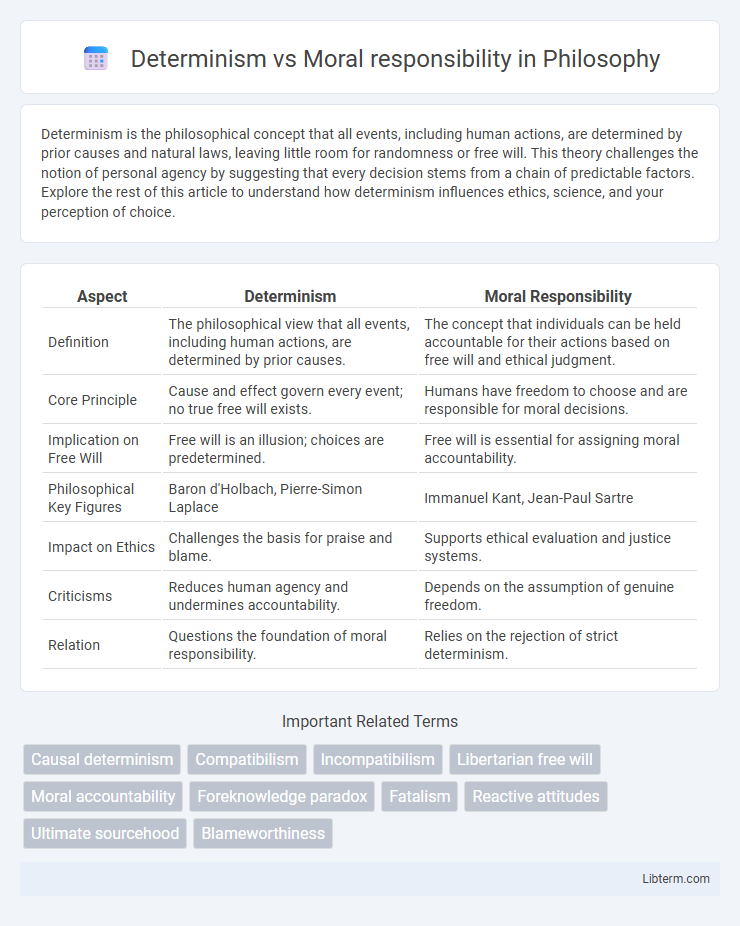Determinism is the philosophical concept that all events, including human actions, are determined by prior causes and natural laws, leaving little room for randomness or free will. This theory challenges the notion of personal agency by suggesting that every decision stems from a chain of predictable factors. Explore the rest of this article to understand how determinism influences ethics, science, and your perception of choice.
Table of Comparison
| Aspect | Determinism | Moral Responsibility |
|---|---|---|
| Definition | The philosophical view that all events, including human actions, are determined by prior causes. | The concept that individuals can be held accountable for their actions based on free will and ethical judgment. |
| Core Principle | Cause and effect govern every event; no true free will exists. | Humans have freedom to choose and are responsible for moral decisions. |
| Implication on Free Will | Free will is an illusion; choices are predetermined. | Free will is essential for assigning moral accountability. |
| Philosophical Key Figures | Baron d'Holbach, Pierre-Simon Laplace | Immanuel Kant, Jean-Paul Sartre |
| Impact on Ethics | Challenges the basis for praise and blame. | Supports ethical evaluation and justice systems. |
| Criticisms | Reduces human agency and undermines accountability. | Depends on the assumption of genuine freedom. |
| Relation | Questions the foundation of moral responsibility. | Relies on the rejection of strict determinism. |
Understanding Determinism: An Overview
Determinism posits that every event, including human actions, is causally determined by preceding factors, challenging the notion of free will. This concept suggests that moral responsibility may be undermined if individuals cannot act otherwise than they do. Understanding determinism involves exploring its implications on autonomy, accountability, and the ethical frameworks that govern human behavior.
Defining Moral Responsibility
Moral responsibility refers to the obligation individuals have to be accountable for their actions based on the capacity for rational decision-making and understanding of right and wrong. Determinism challenges this concept by arguing that all events, including human actions, are causally determined by preceding events, potentially undermining the autonomy required for moral responsibility. The debate centers on whether individuals can be truly responsible if their choices are predetermined by factors beyond their control.
Historical Perspectives on Free Will and Determinism
Historical perspectives on free will and determinism trace back to ancient philosophers like Aristotle, who emphasized human agency, and Stoics, who advocated for determinism through natural causality. In the Enlightenment era, thinkers such as Immanuel Kant reconciled determinism with moral responsibility by asserting autonomous rational will as the foundation for ethics. This evolving discourse shaped contemporary debates on whether moral accountability can coexist with a deterministic understanding of human behavior.
The Case for Causal Determinism
Causal determinism asserts that every event, including human actions, is necessitated by preceding causes, challenging the notion of free will. Philosophers argue that if all thoughts and decisions are outcomes of prior states of the universe, moral responsibility must be reconsidered within this framework. This perspective emphasizes the predictive power of causality while raising questions about accountability and ethics in deterministic contexts.
Compatibilism: Can Freedom Coexist with Determinism?
Compatibilism argues that freedom can coexist with determinism by redefining free will as the capacity to act according to one's desires and intentions without external coercion. This philosophical stance maintains that moral responsibility remains intact because individuals can be held accountable for actions that stem from their internal motivations, even if those causes are determined by prior events. Key thinkers like Daniel Dennett and Harry Frankfurt emphasize the importance of rationality and self-control in aligning determinism with moral agency.
Incompatibilism: The Challenge to Moral Responsibility
Incompatibilism argues that determinism and moral responsibility cannot coexist because if every event is causally determined, individuals lack true freedom to choose their actions. This position challenges the basis of moral responsibility by asserting that holding people accountable requires genuine alternative possibilities and control over their decisions. Empirical studies in neuroscience and psychology further complicate this debate by revealing subconscious influences on behavior that question conventional notions of free will.
Neuroscience and the Illusion of Free Will
Neuroscience research reveals that neural activity predicting decisions occurs before conscious awareness, challenging traditional notions of free will and suggesting that determinism governs human behavior. Studies using brain imaging techniques, such as fMRI and EEG, demonstrate that decision-making processes are initiated subconsciously, raising questions about moral responsibility in contexts where individuals may lack true agency. The illusion of free will, supported by the brain's complex circuitry, implies that accountability frameworks require reevaluation in light of deterministic influences on human actions.
Legal and Ethical Implications of Determinism
Determinism challenges traditional notions of moral responsibility by suggesting that all actions are causally determined, potentially undermining the basis for legal accountability and punitive justice. Legal systems must navigate the tension between upholding individual responsibility and recognizing deterministic influences such as genetic predispositions or environmental factors. Ethical debates intensify as determinism calls for reforms in sentencing, rehabilitation, and the allocation of blame, emphasizing a more nuanced understanding of human behavior within jurisprudence.
Critiques and Counterarguments: Defending Moral Accountability
Critiques of determinism argue that if human actions are predetermined by prior causes, moral responsibility is undermined because individuals lack genuine freedom to choose otherwise. Counterarguments emphasize compatibilism, asserting that moral accountability remains valid if actions align with an agent's desires and intentions, even within a deterministic framework. Philosophers like Daniel Dennett defend moral responsibility by highlighting the practical necessity of maintaining ethical systems that promote social order and personal growth.
Moving Forward: Reframing Moral Responsibility in a Deterministic World
Reframing moral responsibility in a deterministic world involves recognizing how causal chains influence human behavior without negating accountability. Emphasizing compatibility between determinism and ethics promotes a forward-looking approach, stressing rehabilitation and proactive social policies rather than punishment. This shift nurtures a nuanced understanding of responsibility aligned with scientific insights on human decision-making and environmental factors.
Determinism Infographic

 libterm.com
libterm.com